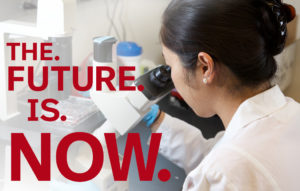It’s Time To Act: Take our Genetic Test Survey
 We are entering a time of great hope for individuals with FSH muscular dystrophy, as new treatment approaches target the root genetic cause of the disease. But this means that people will need a genetic test for FSHD in order to participate in clinical trials and to be prescribed these treatments (once they get approved by the FDA).
We are entering a time of great hope for individuals with FSH muscular dystrophy, as new treatment approaches target the root genetic cause of the disease. But this means that people will need a genetic test for FSHD in order to participate in clinical trials and to be prescribed these treatments (once they get approved by the FDA).
We need to know more about your experiences with genetic testing so that we can help companies and academic researchers who are working to improve genetic tests.
The currently available genetic test is based on decades-old technology called a Southern blot. The technique is time- and labor-intensive, and so the cost is high, around $2,000 to 3,000 per test. If your insurance does not cover the cost, that’s a big hit to the wallet—even more so if you have other family members who wish to get tested. Even if finances are not an obstacle, many patients have difficulty finding a doctor who is willing and able to order the testing.
Understanding the Genetic Testing Experiences of EVERY Patient is Important. Click on the link below to participate in our survey.
The current approach to genetic testing is only set up to provide a yes-no answer to the question, does this individual have FSHD? But scientists would like to collect more genetic information to see if they can find other variations in genes that could explain disease severity.
Right now, this type of analysis is only done in research labs and requires a separate study, patient recruitment outreach and re-doing the original genetic testing from scratch. If more comprehensive analysis could be done during routine diagnostic testing, it would not only save time and resources, but it would provide invaluable information from the get-go. It might help us better predict the course of the disease in specific individuals. It could reveal new strategies to treat the disease.
This is why the FSHD Society is partnering with companies and academic researchers to validate new technologies for diagnosing FSHD—faster, cheaper, and more completely. As one of the key projects of our FSHD Therapeutic Accelerator, our genetic diagnosis initiative is a no-brainer. It will benefit patients and families directly while bringing important new scientific insights.


I tried to get genetic testing but couldn’t, have a strong family history of Fshd, mother had it and sister has it and all mothers siblings had it, along with my grandfather, couldn’t get approved for Fshd 2 testing, but would like to offer my blood for research, have some facial weakness, and I am 60 years old, but is mild,
I received my diagnosis Of FSHD some 30 years ago, with a muscle biopsy. Last year i had genetic testing (spit test). This was inconclusive about which type of
Of FSHD. I was not aware there is more than one kind of FSH. I will go ahead with the blood draw test. I would like to know if this qualifies me for a clinical trials? I will be 75 this year, Am I too old?
Good for you for wanting to volunteer for a study. Oftentimes, clinical trials of experimental therapies do have an upper age limit (typically 60 or 65), but important clinical research studies such as the ReSOLVE are open to people up to the age of 75. You’d need to inquire to find out if you would be eligible. We certainly encourage you to try!